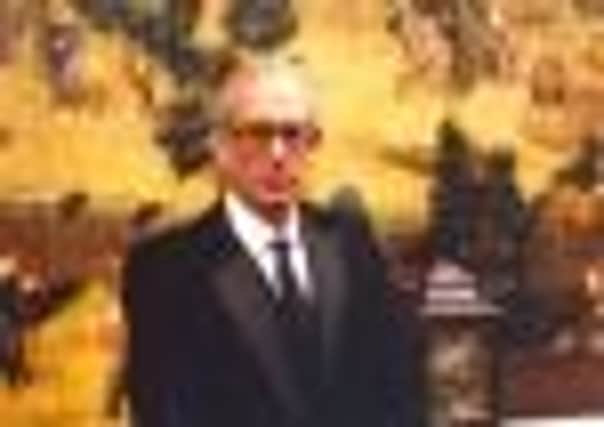Obituary: Sir David Money-Coutts KCVO, banker


Sir David Money-Coutts was the seventh generation of the family who was connected with the famous bank, Coutts & Co. It has looked after the monarch and the Royal Family’s financial affairs for centuries and also acts for many aristocratic and wealthy customers. Coutts is proud of its traditions and, now owned by the Royal Bank of Scotland, provides a discrete and private financial service. Money-Coutts, always the essence of tact and diplomacy, throughout his years as chairman was keen to preserve that image and insisted that all gentlemen members of staff continue to wear tail coats, striped trousers and smart white shirts. Money-Coutts regarded such formal attire as “good for morale, because everyone looks smart”.
David Burdett Money-Coutts spent his early childhood in Ayrshire where his parents were living at Swinlees, Dalry. His father was a lieutenant in the 4th/5th battalion of the Royal Scots Fusiliers.
Advertisement
Hide AdAdvertisement
Hide AdMoney-Coutts was educated at Eton and, after national service with the 1st Royal Dragoons, read politics, philosophy and economics at New College, Oxford. Many members of the family had worked in Coutts & Co but his father was a director of Imperial Tobacco Company. Money-Coutts joined the bank in 1954, becoming a junior director four years later.
The bank has ancient connections with Scotland. Campbells Bank was formed in 1692 by a young Scots goldsmith-banker, John Campbell of Lundie in Angus. His business prospered and he moved south to open a branch on the Strand, in London, under a sign of the Three Crowns. Coutts continues to have its headquarters in that building and its logo is still the Three Crowns.
In 1990, Coutts and National Westminster decided to expand internationally and the Coutts Group was formed. In 2000 when NatWest Group was taken over by Royal Bank of Scotland Coutts became the private banking arm of the organisation.
Robert Louis Stevenson mentions Coutts & Co in Dr Jekyll and Mr Hyde as being the bank of choice for Dr Jekyll.
Money-Coutts preserved a strict routine and worked unstintingly to preserve the bank’s international reputation. He was keen to expand the number of wealthy customers whose affairs the bank manages. Throughout his time as chairman he ensured that financial experts were available within the bank to provide specialist advice to clients. To this end he was enthusiastic when Coutts & Co opened an office in Geneva and maintained a presence at the Cannes Film Festival.
But Money-Coutts was adamant that the bank should provide a traditional and reliable service to its clients. Coutts urged his staff to communicate to all clients that the bank fulfilled the old-fashioned job of providing a solid bank account along with a professional and prudent service.
Money-Coutts seldom altered his daily schedule. After dealing with the morning post he attended a meeting regarding internal administration matters at 10am, loans at 11:30 and trustee business at noon. After lunch he had further meetings and attended to private family matters. Money-Coutts was never, however, a remote figure. He did not have his own private office but insisted that the chairman was always on hand to discuss matters with his staff. To this end his desk was in an open-plan office, making him readily available to colleagues.
A major event during Money-Coutts’ chairmanship was the modernisation and complete refurbishment of the Strand building. After a lengthy consultation period the designs by Sir Frederick Gibberd – incorporating the first glazed atrium and internal garden in a London office – were completed and ready to be opened in 1978.
Advertisement
Hide AdAdvertisement
Hide AdThe Queen formally opened the new bank and Money-Coutts commented in his speech of welcome that his great-great-great-great-grandfather Thomas had been a Gentleman of the Privy Chamber to hers, George III. “With all those greats on both sides,” Her Majesty replied, “I do indeed agree that this is very much a family occasion.”
He was on the board of several established City institutions, such as Charifund and Gerrard Group. Away from his banking duties Money-Coutts devoted much time to various charities. These were principally concerned with healthcare and he was a governor of Middlesex Hospital, a member of the Kensington, Chelsea and Westminster Area Health Authority, chairman of the Medical Schools Council and a trustee of the Multiple Sclerosis Society. He was also chairman of the Scout Foundation and the Old Etonian Trust.
Money-Coutts, a keen countryman and gardener, was made a KCVO in 1971. In 1958 he married Penelope Todd, who survives him with their son and two daughters.
Alasdair Steven